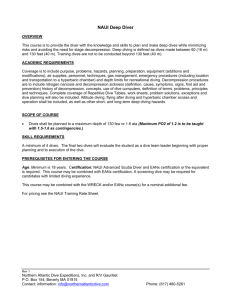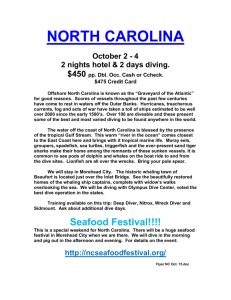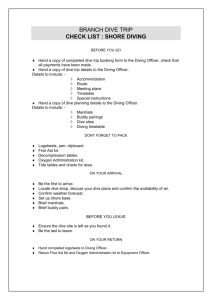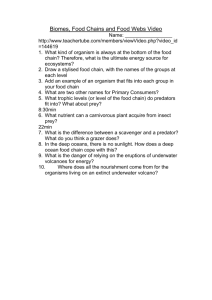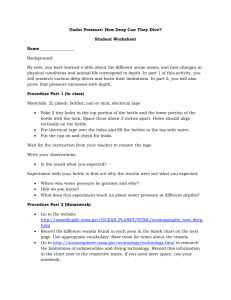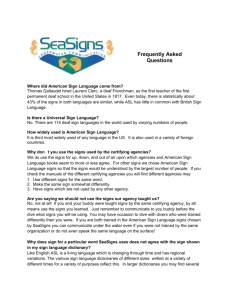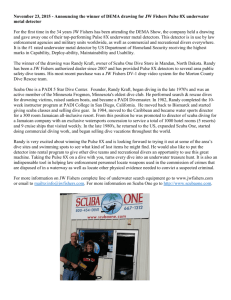syllabus
advertisement
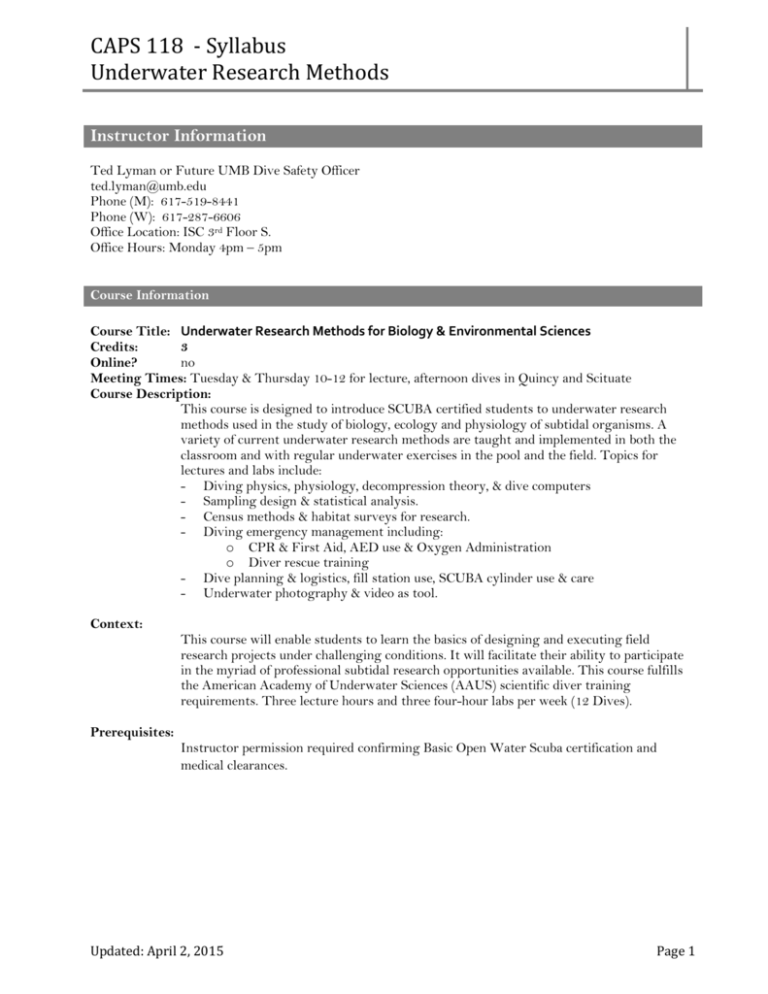
CAPS 118 - Syllabus Underwater Research Methods Instructor Information Ted Lyman or Future UMB Dive Safety Officer ted.lyman@umb.edu Phone (M): 617-519-8441 Phone (W): 617-287-6606 Office Location: ISC 3rd Floor S. Office Hours: Monday 4pm – 5pm Course Information Course Title: Underwater Research Methods for Biology & Environmental Sciences Credits: 3 Online? no Meeting Times: Tuesday & Thursday 10-12 for lecture, afternoon dives in Quincy and Scituate Course Description: This course is designed to introduce SCUBA certified students to underwater research methods used in the study of biology, ecology and physiology of subtidal organisms. A variety of current underwater research methods are taught and implemented in both the classroom and with regular underwater exercises in the pool and the field. Topics for lectures and labs include: - Diving physics, physiology, decompression theory, & dive computers - Sampling design & statistical analysis. - Census methods & habitat surveys for research. - Diving emergency management including: o CPR & First Aid, AED use & Oxygen Administration o Diver rescue training - Dive planning & logistics, fill station use, SCUBA cylinder use & care - Underwater photography & video as tool. Context: This course will enable students to learn the basics of designing and executing field research projects under challenging conditions. It will facilitate their ability to participate in the myriad of professional subtidal research opportunities available. This course fulfills the American Academy of Underwater Sciences (AAUS) scientific diver training requirements. Three lecture hours and three four-hour labs per week (12 Dives). Prerequisites: Instructor permission required confirming Basic Open Water Scuba certification and medical clearances. Updated: April 2, 2015 Page 1 CAPS 118 - Syllabus Underwater Research Methods Prerequisite Skills: Each student must show proof of the following prior to beginning the course: 1. Nationally recognized diving certification (PADI, NAUI, SSI/STI etc.) 2. UMB Diver’s Physical Examination 3. UMB Waiver Documentation 4. Swim-test a. Potential students must demonstrate that they are comfortable in water by passing a swimming/watermanship test acceptable to the instructor, including but not limited to: i. Swim underwater 25 meters/yards without surfacing. ii. Swim 400 meters/yards in less than 12 minutes. iii. Tread water for 10 minutes or 2 minutes without the use of hands iv. Transport another person of equal size 25 meters/yards in the water. Course Objectives: By the end of the course you should be able to: 1. Demonstrate proficiency in diving emergency care training. 2. Demonstrate proficiency in dive rescue and accident management. 3. Understand dive physics, physiology, decompression theory and dive planning. 4. Understand scientific diving regulations and history. 5. Demonstrate proficiency in underwater data gathering techniques. 6. Apply the scientific method: Formulate hypotheses, design experiments and analyze results from field-based research. 7. Report findings to peers by way of talks and PowerPoint presentations. 8. Research both primary and secondary literature using the library and online resources. 9. Be able to work cohesively in small groups to complete field based underwater research. Course Goals: The objectives for this course focus on the following core competencies: 1. To acquire an understanding of various scientific techniques, including hypothesis formulation and testing, sampling design, statistical analysis, library research, writing and presentation. 2. To acquire an understanding of commonly applied marine underwater research methodologies. 3. To acquire an understanding of the biology, ecology and physiology of marine organisms. 4. To acquire a deeper understanding of dive physics, physiology, decompression theory and dive planning. 5. To train and prepare research divers for diving related accidents & emergencies. 6. To fulfill the national training requirements of the AAUS for scientific diving. Updated: April 2, 2015 Page 2 CAPS 118 - Syllabus Underwater Research Methods Required Assignments: Final Project/Presentation: Students will give a short (5-10 minute) presentation on one of the research project completed during the class. Project will include a simple analysis of both the data collected and the methods used. Lab Notebook: Students are expected to keep a lab notebook/dive log during the class. All field notes and data collected on each of the assigned research experiments will be kept in a lab notebook. All dives will be logged at the end of each dive in this notebook as well. This will be collected at the end of the course Rescue Skills Evaluations: Students will be expected to demonstrate proficiency for both in-water and out of water rescue skills learned in class. Diving Emergency Presentation: Students will be asked to give a 3 to 5 minute presentation of a case study on a diving emergency scenario. The emergency scenario will be assigned in class. Mid-Term Exam: Students are expected to pass a mid-term exam consisting of underwater identification of key species while in the field. Course Rubric: Assignment/Deliverable 1. Mid-Term Exam 2. Lab Notebook 3. Rescue Skills Evaluations 4. Diving Emergency Presentation 5. 6. 7. Final Project/Presentation Group Work Participation (as defined below) Attendance (as defined below) Number Grade % 20 10 5 5 20 20 20 Course Policies: Attendance – Students are expected to attend every lecture and field lab Participation – Students are expected to: Complete all required reading and writing assignments prior to class Thoughtfully participate in class discussions & presentations Take responsibility for helping create a positive learning environment by arriving promptly, listening respectfully, and participating constructively Provide general assistance in fieldwork preparation and clean up Entering all data and logging dives in a timely manner Group Work – Final projects may be group projects, however, the final product is expected to be commensurate with having multiple students working on the project. Grading Grading: Grade type for the course is a whole or partial letter grade. (Please see table below) Updated: April 2, 2015 Page 3 CAPS 118 - Syllabus Underwater Research Methods Note: the lowest passing grade for a graduate student is a “C”. Grades lower than a “C” that are submitted by faculty will automatically be recorded as an “F”. Please see the Graduate Catalog for more detailed information on the University’s grading policy. Grading Policy Letter Grade A AB+ B BC+ C F INC IF W AU NA Quality Points Percentage 93-100% 90-92% 87-89% 83-86% 80-82% 77-79% 73-76% 0-72% 4.00 3.75 3.25 3.00 2.75 2.25 2.00 0.0 A grade of Incomplete (INC) is not automatically awarded when a student fails to complete a course. Incompletes are given at the discretion of the instructor. They are awarded when satisfactory work has been accomplished in the majority of the course work, but the student is unable to complete course requirements as a result of circumstances beyond his/her control. The student must negotiate with and receive the approval of the course instructor in order to receive a grade of incomplete Received for failure to comply with contracted completion terms. Received if withdrawal occurs before the withdrawal deadline. Audit (only permitted on space-available basis) Not Attending (student appeared on roster, but never attended class. Student is still responsible for tuition and fee charges unless withdrawal form is submitted before deadline. NA has no effect on cumulative GPA.) N/A N/A N/A N/A N/A Required Text(s): UMass Boston Diving Manual Lab Notebook Technical Requirements: Full cold water SCUBA diving gear including: cold water immersion protection (wet suit (7mm) or dry suit – with hood, gloves, boots), buoyancy compensator (BC), regulator with backup (octopus reg.), gauges (depth, tank pressure), dive computer, compass, mask & snorkel, fins. Rental information and a discount will be provided for students who do not have their own gear. Catch Bag, Dive slate, clip Course Schedule Day May 26th Topic Lect – Intro to Scientific Diving, Dive Physics & Physiology Updated: April 2, 2015 Reading UMB Manual Ch 1- 3 Page 4 CAPS 118 - Syllabus Underwater Research Methods Lab Lab Checkout Dives, UMB Pool May 28th Lect Decompression Theory, Dive Tables & Computers Lab Checkout Dives/Underwater Navigation, UMB Pool UMB Manual Ch 7,9,10 June 2nd Lect Dive Planning & Accident Management Dive Rescue Techniques, Boat Entries and Exits UMB Manual Ch 4-6,11 June 4th Lect DAN First Aid for Professional Divers Lab Crepidula survey at Quincy Bay DAN Manual June 9th Lect Experimental Design & Sampling Methodology Lab Kelp Growth Set up Dive, Black Rock Beach, Cohasset Hurlbert 1984 June 11th Lect Sampling techniques; Quads, Point Counts, and More Lab Diving Professions: Forum with divers from MWRA, EPA, and more Lab Manual Ch 2 June 16th Lect Intro to Statistics Fish Habitat Surveys Lab Habitat Survey of Black Rock Beach, Cohasset Lab Manual Ch 1 Lab Manual Ch 3 June 18th Lect Methods of quantification of mobile fauna Review of mobile fauna Lab Analysis of mobile fauna of Black Rock Beach, Cohasset Lab Manual Ch 4 June 20th Lect Underwater photography principles & methods Lab Underwater camera use Underwater Species ID Exam Lab Manual Ch 5 June 23nd Project Dives (2) June 25th Project Dives (2) June 30th Project Presentations Project Reports Due Lab Notebook Due Methods of Instruction Methods: Lecture will be practical knowledge with hands-on examples. All morning lectures will be reinforced with afternoon lab work, diving in the field. Accommodations Updated: April 2, 2015 Page 5 CAPS 118 - Syllabus Underwater Research Methods The University of Massachusetts Boston is committed to providing reasonable academic accommodations for all students with disabilities. This syllabus is available in alternate format upon request. If you have a disability and feel you will need accommodations in this course, please contact the Ross Center for Disability Services, Campus Center, Upper Level, Room 211 at 617.287.7430. http://www.umb.edu/academics/vpass/disability/ After registration with the Ross Center, a student should present and discuss the accommodations with the professor. Although a student can request accommodations at any time, we recommend that students inform the professor of the need for accommodations by the end of the Drop/Add period to ensure that accommodations are available for the entirety of the course. Academic Integrity and the Code of Student Conduct Code of Conduct and Academic Integrity It is the expressed policy of the University that every aspect of academic life--not only formal coursework situations, but all relationships and interactions connected to the educational process--shall be conducted in an absolutely and uncompromisingly honest manner. The University presupposes that any submission of work for academic credit is the student’s own and is in compliance with University policies, including its policies on appropriate citation and plagiarism. These policies are spelled out in the Code of Student Conduct. Students are required to adhere to the Code of Student Conduct, including requirements for academic honesty, as delineated in the University of Massachusetts Boston Graduate Catalogue and relevant program student handbook(s). UMB Code of Student Conduct You are encouraged to visit and review the UMass website on Correct Citation and Avoiding Plagiarism: http://umb.libguides.com/citations Penalties for academic misconduct in the course, including plagiarism and cheating, are strictly enforced, and the penalties are very serious. Penalties include an F in the assignment or exam, an F in the course, or suspension from the University. If you have questions about what constitutes plagiarism or other forms of academic misconduct, see Prof. Byrnes before completing an assignment or exam. Ignorance of the rules does not excuse any academic conduct violation. The University defines violations to include, but not be limited to, the following: Submitting as one's own an author's published or unpublished work (e.g. material from a journal, Internet site, newspaper, encyclopedia), in whole, in part, or in paraphrase, without fully and properly crediting the author. Submitting as one's own work or materials obtained from another student, individual, or agency without full and proper attribution. Submitting as one's own work material that has been produced through unacknowledged or unauthorized collaboration with others. Submitting substantially the same work to more than one course (i.e., dual or multiple submission) without prior approval from all instructors involved. Using any unauthorized material during an examination, such as notes, tests, calculators, cell phones, or other electronic devices. Updated: April 2, 2015 Page 6 CAPS 118 - Syllabus Underwater Research Methods Obtaining answers to examination questions from another person with or without that person's knowledge; furnishing answers to examination questions to another student; using or distributing unauthorized copies of or notes from an examination. Submitting as one's own an examination taken by another person; or taking an examination in another person's place. Interfering with an instructor's ability to evaluate accurately a student's competence or performance; misleading any person in connection with one's academic work. Other Pertinent and Important Information Cell Phones: Cell phones must be POWERED OFF during class. Much of this class is discussion, and use of phones in class is disruptive and disrespectful to your fellow students to withdraw from the conversation. I will give you one warning inside or outside of class, and then ask you to please leave in any future classes if it happens again. That class will be counted as an unexplained absence. Attendance in WIMBA Sessions: You are responsible for material covered in any class that you do not attend. If you miss a WIMBA session you must review the recorded class and write a 1-2-page summary of your understanding of what was covered. Incomplete Policy: [Include what is documented in Graduate Catalog] Coursework Difficulties: Please discuss all coursework matters with me sooner than later. Withdrawing From This Course: Please refer to the written policies and procedures on formal withdrawal and add/change dates listed in the Graduate Studies Catalog. You are advised to retain a copy of this syllabus in your personal files for use when applying for future degrees, certification, licensure, or transfer of credit. Bibliography Hurlbert, S.H., 1984. Pseudoreplication and the Design of Ecological Field Experiments. Ecological Monographs. 54, 187. Updated: April 2, 2015 Page 7
